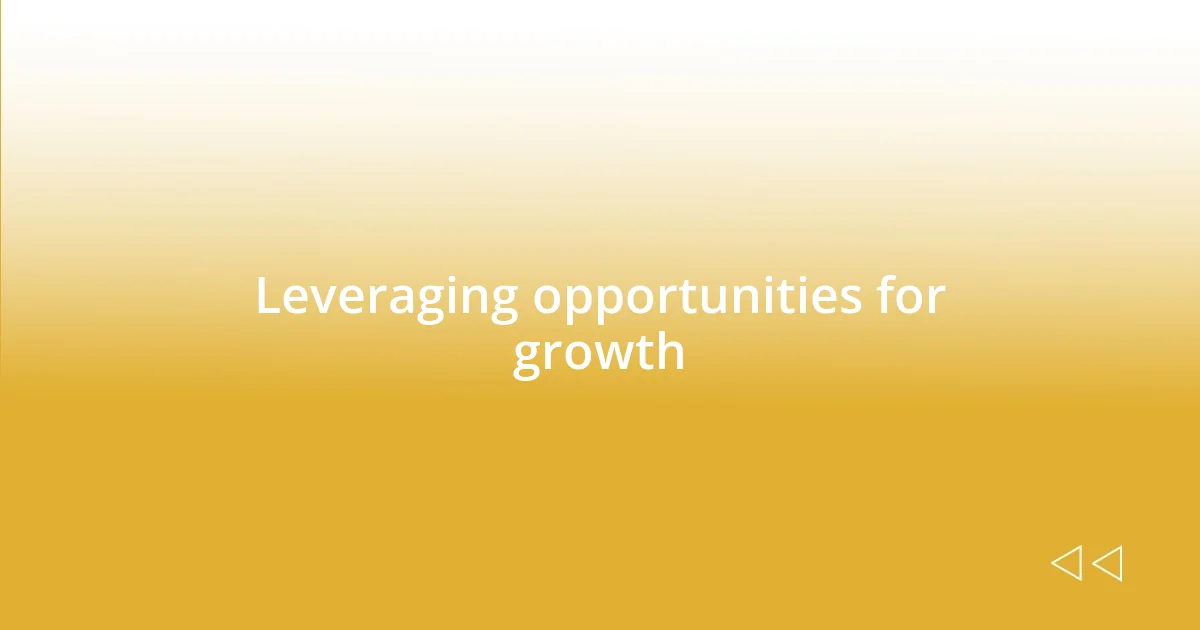Key takeaways:
- Understanding personal aspirations involves self-reflection on values, career goals, and the alignment between personal fulfillment and professional growth.
- Navigating challenges in fast food emphasizes the importance of teamwork, calm communication under pressure, and adaptability to change to foster a collaborative environment.
- Building a supportive network is crucial for growth, highlighting the value of collaboration, open dialogue, and nurturing relationships with colleagues to enhance resilience and morale.

Understanding personal aspirations
Understanding our personal aspirations is a journey that can be both exciting and daunting. I remember a time in my early career when I sat in a busy fast-food restaurant, observing the team around me. I wondered: what drives each person here? Is it the thrill of a bustling environment, the aspiration for upward mobility, or merely a way to make ends meet? Each of us paints a different picture of success shaped by our experiences and desires.
Aspirations are deeply tied to our values and dreams, often revealing what we truly want from life. I recall feeling a spark of enthusiasm when I worked my way up from a cashier to a management position. That feeling wasn’t just about the title; it reflected my desire to lead and empower others. Have you ever felt a moment where your aspirations aligned perfectly with your day-to-day work? Those moments show us that our dreams evolve, influenced by both our achievements and setbacks.
Taking time to reflect on our aspirations can clarify what matters most. For me, figuring out the balance between personal fulfillment and professional growth has always been a challenge. I often ask myself, “What impact do I want to have on my team and the customers we serve?” This self-inquiry helps me stay aligned with my goals, urging me to explore new avenues and continuously adapt to the fast-paced world of fast food.

Identifying values in fast food
In the fast-food industry, identifying values can often be a process of introspection amidst the hustle. I remember reflecting on my own journey during a late-night shift, when the restaurant quieted down. I thought about what kept me coming back each day. It wasn’t merely the paycheck; it was the camaraderie with my colleagues and the sense of being part of something larger. Fast food isn’t just about speed; it’s built on values like teamwork, customer service, and adaptability.
To truly pinpoint values in fast food, I’ve found it helpful to focus on key aspects that resonate on both a personal and professional level:
- Teamwork: Collaborating with others to achieve shared goals.
- Customer Satisfaction: Ensuring every guest has a positive experience.
- Integrity: Upholding honesty in all dealings, from management to staff.
- Efficiency: Prioritizing speed without compromising quality.
- Innovation: Embracing new ideas to stay relevant in a competitive landscape.
These values form the foundation of what it means to thrive in this space. They can guide choices and create meaningful connections, both with the team and the customers we serve daily.

Setting achievable career goals
Setting achievable career goals in fast food can often feel like navigating a maze. I vividly recall one particular moment early in my career when I decided to aim for a position beyond crew member. Setting my sights on becoming a shift leader transformed my motivation. I created a plan that included seeking mentorship from my supervisor and taking on additional responsibilities. This approach not only made my goals feel tangible but also laid a strong foundation for my future growth. Have you identified steps that make your aspirations more tangible?
Realistically assessing my strengths has been crucial in goal-setting. I remember sitting down with a notepad, reflecting on both my skills and areas for improvement. Knowing I excelled at customer service but needed to enhance my leadership abilities allowed me to set specific, achievable targets. I focused on taking part in team meetings to fine-tune my communication skills. This type of self-awareness is a powerful tool; it guides you toward setting goals that are not just lofty dreams, but actually attainable steps based on your current capabilities.
Moreover, I’ve learned the importance of flexibility while pursuing these goals. In fast food, the landscape can change rapidly, so it’s vital to adapt your aspirations as you progress. There were times I had to pivot when unexpected opportunities arose, like a sudden opening for a training position. Accepting those shifts can lead to even more enriching experiences than originally planned. Keeping a mindset open to change has also helped me view setbacks as new chances to recalibrate my career objectives.
| Aspect | Details |
|---|---|
| Setting Specific Goals | Identifying a clear aim, like becoming a shift leader, provides a roadmap for growth. |
| Assessing Strengths | Understanding your skills ensures your goals are grounded in reality. |
| Embracing Flexibility | Being open to change allows your career objectives to evolve alongside opportunities. |

Navigating challenges in fast food
Navigating challenges in fast food often requires a quick shift in mindset. I recall a particularly hectic Saturday evening when an unexpected rush hit our restaurant. The kitchen was overwhelmed, and I could see the stress mounting on my co-workers’ faces. In that moment, I remembered the importance of staying calm under pressure. I stepped in to help organize tasks, prioritizing the most critical orders first. This experience taught me that a sense of urgency doesn’t mean compromising teamwork; instead, it can be an opportunity to strengthen collaboration.
When facing challenges, communication becomes a lifeline. I vividly remember a shift where we encountered a malfunctioning fryer during peak hours. Instead of panicking, I gathered the team to discuss a temporary solution. We decided to rotate responsibilities and communicate openly about our progress. This experience reinforced my belief that transparent dialogue can turn a potential disaster into a manageable situation. How often do we underestimate the power of a simple conversation in diffusing tension?
Adapting to constant change is another hurdle in this industry. In my early days, I struggled with the rapid adjustments required, whether it was new menu items or revised protocols. One evening, we introduced a brand-new burger, and I felt overwhelmed with unfamiliarity. However, I leaned on my passion for learning and took the initiative to practice. This proactive approach enabled me to embrace challenges rather than shy away. I’ve found that viewing such moments as chances to grow has transformed my perspective. Isn’t it exciting how each challenge can serve as a stepping stone toward greater expertise?

Leveraging opportunities for growth
Leveraging opportunities for growth in the fast food industry is all about recognizing and seizing the moments that come your way. I remember when a district manager visited our store, looking for potential candidates for a leadership training program. I seized that moment, actively asking questions and showcasing my enthusiasm. This proactive stance not only made me stand out but opened up a pathway that would enhance my skill set significantly. Isn’t it fascinating how a single encounter can shift your career trajectory?
You might be surprised at how small actions can lead to substantial opportunities. There was an instance when our team initiated a “suggestion box” for employee feedback, and I took the lead in organizing reviews. By bringing everyone together for discussions on potential improvements, I not only highlighted my leadership skills but also fostered a collaborative atmosphere among our crew. Have you thought about how contributing to team initiatives can position you for growth? This experience made me realize how impactful teamwork can be, unlocking doors I didn’t even know existed.
Every experience, be it big or small, offers you a chance to refine your professional journey. I once volunteered to train new hires, which allowed me to enhance my coaching skills while also reinforcing my own knowledge. This not only gave me satisfaction but positioned me as a go-to person in our restaurant, elevating my reputation among colleagues. Reflecting on this, I’ve come to appreciate the importance of taking initiative. What opportunities are you currently overlooking? It’s worth considering what potential you might be missing by not stepping forward.

Building a supportive network
Building a supportive network in fast food is essential for personal and professional growth. I recall a time when I felt overwhelmed during a particularly challenging shift. Instead of trying to manage everything alone, I reached out to a colleague who had more experience. That simple act of asking for help not only lightened my load but also forged a stronger bond between us. Isn’t it incredible how vulnerability can open doors to deeper connections?
Collaboration is at the heart of any supportive network. During a busy summer promotion, our team decided to host weekly check-ins to address any concerns or share best practices. I remember one meeting where a co-worker shared a creative way to handle customer complaints. It sparked a lively discussion, and I realized we were all learning from one another. This shared knowledge not only improved our service but also solidified our sense of camaraderie. Have you ever considered how collective experiences can shape a more resilient team?
Nurturing relationships within the workplace is an ongoing process. I often invite my team members out for coffee after shifts. These informal chats allow us to connect on a personal level, beyond our roles at work. I’ve learned so much about their aspirations and challenges, reinforcing how vital these connections are. Every conversation strengthens our network, making it easier to tackle challenges together. How often do you invest time in building these invaluable relationships?















